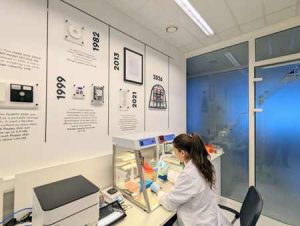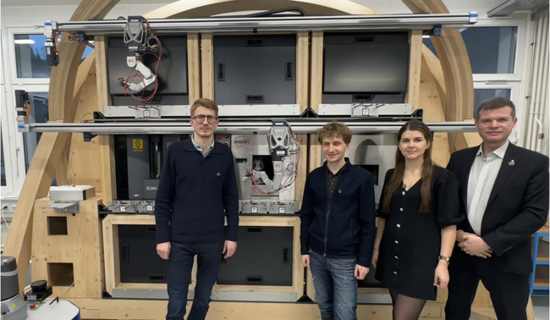Lithuanians Scientist Develop Solutions for DNA-Based Information Storage Technology
Will develop HDD based on DNA molecules within 3 years.
This is a Press Release edited by StorageNewsletter.com on July 9, 2024 at 2:01 pmFrom Kaunas University of Technology
A new field of science – DNA storage – is being developed in Lithuania. Genomika company together with Kaunas University of Technology and other partners, aims to develop an autonomous solution for archiving data in DNA structures. The total value of the project is more than €5 million.
 According to Renaldas Raišutis, director, K. Baršauskas Ultrasound Research Institute at Kaunas University of Technology (KTU URI), the DNA cache can perfectly archive large amounts of data.
According to Renaldas Raišutis, director, K. Baršauskas Ultrasound Research Institute at Kaunas University of Technology (KTU URI), the DNA cache can perfectly archive large amounts of data.
“In a globally digitalised society, more and more data is created and used every year. Conventional data storage centres consume 1.5% of the world’s electricity and emit 200 million tonnes of carbon dioxide (CO2) per year,” he says.
He says there is a global search for reliable, high-density, sustainable and economically viable data storage solutions. For this reason, the enormous potential of storing data in DNA molecules has become apparent.
In 2060, entire surface of earth would be covered
The KTU professor says that 65 years ago, a 5MB HDD could barely fit in a cargo plane – today it is equivalent to the size of an average digital photograph. However, despite the evolution of storage technologies, the current ones are not meeting the growing demand.
The DNA Microfactory for Autonomous Archiving (DNAMIC) project, led by a Lithuanian company Genomika and together with an international team of researchers will develop a hard drive based on the storage of data in DNA molecules within 3 years.
The project is funded by the EIC Pathfinder programme, part of the European Horizon. This is the 1st project funded by this programme in Lithuania. The programme is aimed at companies developing disruptive technologies – products or services that alter the way that consumers, businesses or industries operate.
DNA Microfactory for Autonomous Archiving Team
According to Dr Lukas Žemaitis, co-founder, Genomika, DNA, an information storage technology that has been developed and refined over billions of years, could be a potential technology for information storage.
Ignas Galminas, second co-founder, Genomika, explains that this invention could solve a multitude of problems related to data storage, such as the use of water and rare metals, longevity and others.
“If the problem of data storage is not solved, by 2060, large data centres will cover the entire surface of the earth,” he notes.
DNA is highly stable and reliable
Genomika, KTU and researchers from 4 other countries are working together to develop the 1st modular drive that will allow a user with no specific knowledge of genetic technologies to record and read digital information using DNA.
Storing information in synthetic DNA structures allows for more efficient use of space, a small footprint and the ability to store information for 1,000s of years with very low energy consumption, says Prof. Raišutis of KTU.
“One attractive feature of DNA caches is their ability to store large amounts of information in a very small space. It is significantly more compact than traditional digital media. DNA is extremely stable and reliable for long-term storage of information,” emphasises Raišutis.
He believes that storing data in DNA caches is particularly relevant in the healthcare sector, as digitised patient data is stored for their entire lifetime. The storage and processing of digitised information is also crucial for the development of new diagnostics and treatments.
The KTU professor notes that this project is of great significance for the future of biotechnology not only in Lithuania but also WW. He says that by working together, science and business can create innovations on a global scale.
“This is an exceptional project coordinated in Lithuania, which contributes to solving a global problem. It is not only technologically but also scientifically relevant, as a new field of science – DNA Storage – is starting to develop in Lithuania,” says Žemaitis, co-founder, Genomika.
Market-changing technology
Mindaugas Bulota, head, KTU’s National Innovation and Entrepreneurship Centre (NIEC), calls the DNA storage technology a game changer in the market. Without the success of bringing together science and business potential, he says, the opportunities would be significantly smaller.
 Bulota emphasises the importance of remaining one step ahead as critical to becoming a world leader and, of course, generating significant economic benefits. As the results of the international projects have a global impact, this enhances Lithuania’s image as a developer of advanced technologies WW.
Bulota emphasises the importance of remaining one step ahead as critical to becoming a world leader and, of course, generating significant economic benefits. As the results of the international projects have a global impact, this enhances Lithuania’s image as a developer of advanced technologies WW.
“Naturally, this also attracts the attention of larger investors. In the long term, we attract more foreign investors, which not only creates new, well-paid jobs but also brings knowledge and technology into the country,” he explains.
While preparing the project application, Genomika and the KTU UMI team worked with international partners – Kilobaser company, Technical University of Munich, University of Applied Sciences and Arts of Western Switzerland, University of Geneva and Imperial College London.
















 Subscribe to our free daily newsletter
Subscribe to our free daily newsletter


